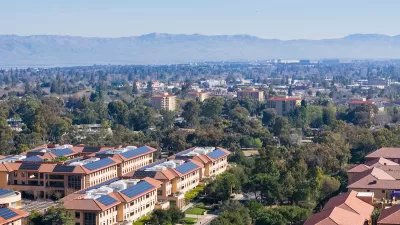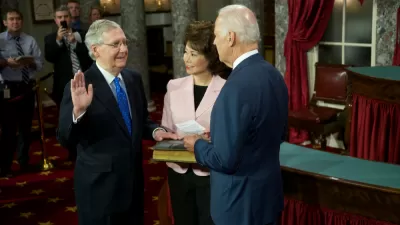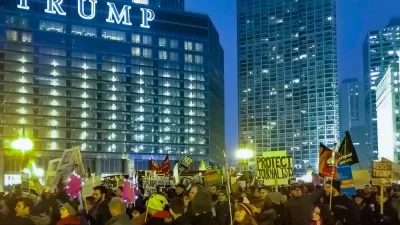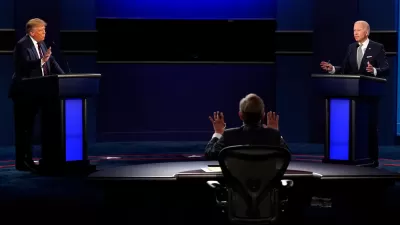The first protectionist policies implemented by the Trump Administration, a key part of the president's campaign platform, will affect the renewable energy industry.

"President Trump slapped steep tariffs on imports of washing machines and solar energy cells and panels on Monday, the first major step by the administration to erect the kind of trade barriers Mr. Trump has frequently said are necessary to protect manufacturers in the United States," report Ana Swanson and Brad Plumer.
The tariffs are the first of an expected series of trade measures that could eventually also reach industries like steel, aluminum, and other products. For now, however, the solar industry and environmentalists are scrambling to make sense of the new policy.
After breaking the news of the new tariffs, Swanson and Plumer wrote a separate article that digs into the human-and-corporate-interest angle of the news. While two solar companies, Suniva and SolarWorld sought the tariffs, "they are expected to ripple throughout the industry in ways that may ultimately hurt American companies and their workers," according to Swanson and Plumer. Moreover, "[e]nergy experts say it is unlikely that the tariffs will create more than a small number of American solar manufacturing jobs, since low-wage countries will continue to have a competitive edge."
Furthering the idea that the tariffs won't be a boon for the entire solar industry, Andrew Maykuth writes an article that checks-in with local solar installation companies in Philadelphia, where the owner of one business is very pessimistic about the effects of the tariffs.
And in a potential surprise take, Al Gore took to the stage at the World Economic Forum in Davos and defended the action by President Trump, saying the tariffs are not "an utter catastrophe."
FULL STORY: rump Slaps Steep Tariffs on Foreign Washing Machines and Solar Products

Study: Maui’s Plan to Convert Vacation Rentals to Long-Term Housing Could Cause Nearly $1 Billion Economic Loss
The plan would reduce visitor accommodation by 25,% resulting in 1,900 jobs lost.

North Texas Transit Leaders Tout Benefits of TOD for Growing Region
At a summit focused on transit-oriented development, policymakers discussed how North Texas’ expanded light rail system can serve as a tool for economic growth.

Why Should We Subsidize Public Transportation?
Many public transit agencies face financial stress due to rising costs, declining fare revenue, and declining subsidies. Transit advocates must provide a strong business case for increasing public transit funding.

How Community Science Connects People, Parks, and Biodiversity
Community science engages people of all backgrounds in documenting local biodiversity, strengthening connections to nature, and contributing to global efforts like the City Nature Challenge to build a more inclusive and resilient future.

Alabama: Trump Terminates Settlements for Black Communities Harmed By Raw Sewage
Trump deemed the landmark civil rights agreement “illegal DEI and environmental justice policy.”

Dear Tesla Driver: “It’s not You, It’s Him.”
Amidst a booming bumper sticker industry, one writer offers solace to those asking, “Does this car make me look fascist?”
Urban Design for Planners 1: Software Tools
This six-course series explores essential urban design concepts using open source software and equips planners with the tools they need to participate fully in the urban design process.
Planning for Universal Design
Learn the tools for implementing Universal Design in planning regulations.
City of Santa Clarita
Ascent Environmental
Institute for Housing and Urban Development Studies (IHS)
City of Grandview
Harvard GSD Executive Education
Toledo-Lucas County Plan Commissions
Salt Lake City
NYU Wagner Graduate School of Public Service





























